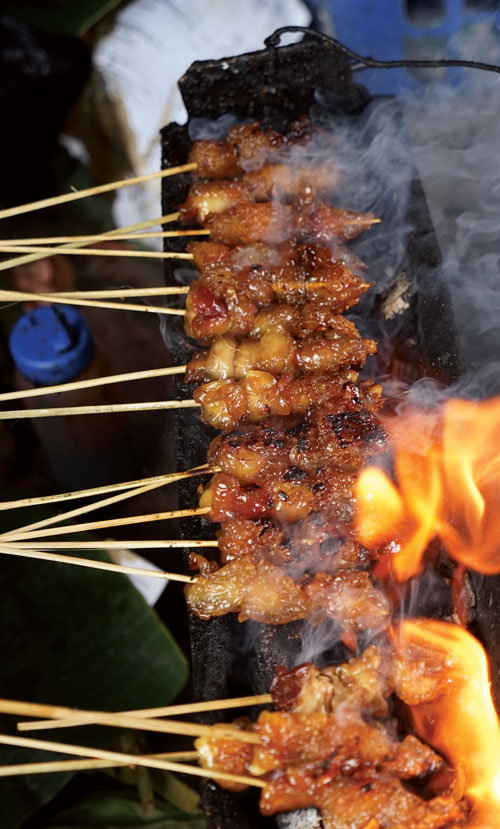



Leslie Davidson, Tungud Estate’s startup Manager, wondered whether a birthday party should be held to mark the first year of development of Sabah’s commercial oil palm estate. He sounded out his friend Tom Prentice, Chairman of Harrisons and Crosfield, Sabah’s premier trading company.
From 1925 to 1955 Harrisons had been the sole owner of every forest tree in the territory – Cinderella’s resources which had never seen the light of day outside Sabah. The London shareholders possibly had no idea they owned such bounty.
A hardworking product of Edinburgh’s public schools, Tom had been appointed chairman of the company’s 10 branches in Sarawak, Brunei and Sabah. He was charged by his London office to further the development of its agencies, which included Straits Steamships and British Overseas Airways; the universally-popular Lister engines; Carrier air-conditioners, and endless items of construction materials, paint, industrial chemicals and even bathroom furniture, all made in Britain.
Sabah, on the other hand, had been devastated by General MacArthur’s softening-up raids before the American forces retook it from Japanese invaders. Its wooden shoplots and houses had been destroyed by bombing; and there was no commercial deep-sea port, veneer mill, plywood mill, timber drying plant or a Forest Department timber laboratory.
But its timber business had begun to thaw out of its ice age by demands from the cause of all the trouble – Japan and its former colony, Korea. The thaw started with a 1955 government decision to break Harrisons’s timber monopoly. Nine new licences were issued and exports permitted for the first time of round timber logs. This was no concern of Unilever’s and certainly not of Leslie’s.
From his year-old attap-and-kajang Labuk riverside quarters Leslie understood that a birthday party might be worth the effort, provided that at least two other interested parties could be shown that oil palm could be grown on former tobacco plantation or rubber land – and accommodate the British government’s demand to “grow more food for Britain”. But what would be Leslie’s sales pitch?
On Unilever’s arrival, Tom had offered to act as their managing agent; every plantation company throughout the Far East with head offices in London – except one – used agency houses to manage their investments. The use of local expertise made good sense. The agent for Unilever’s oil palm in Johore was the Guthrie Corporation.
Harrisons’ investments in Borneo included its branch offices distributed along the coastal towns of the three territories; an expanding domestic timber business and 400 ha of high-quality rubber in Sandakan. Leslie declined Tom’s invitation with thanks, despite their similar backgrounds, the one from Aberdeen, the other from Edinburgh.
But what about other unknowns? Throughout Borneo, oil palm had by 1960 just reached preliminary evaluation – the nearest precedents were the modest 24,000 ha in Malaya compared with 2 million ha of rubber. Where now in Sabah was land available for oil palm?
Due to the lack of roads to the interior, any new sites would be confined to the coastline. Mosytn Estate’s experimental oil palm planting on medium rainfall, fertile volcanic soils was served by its own deep-water port in Kunak, 30km from the plantation. It had been in use since 1920; requiring only a tank farm.
Tungud’s lands, although flat and swampy, had been farmed between 1895 and 1918 by The New London Tobacco Company. What was good for tobacco, a notoriously fickle crop, was very likely good for oil palm, as extensively demonstrated by Dutch planters in Sumatra’s coastal provinces.
How to move palm oil from Tungud to Sandakan? Leslie’s preliminary notes had mentioned dracones; giant rubber tubes of palm oil pulled by ocean-going tug from the plantation to the bulking installation; the very mention of which drew giggles from Unilever’s head office staff.
How to store palm oil until ready for shipment? Unilever offered to carry out the works for the Public Works Department. Its director, stretching to his fullest height, snorted: “Leslie, kindly put in a bid alongside other consultants; we’ll soon find out who knows what they’re talking about.”
How to ship palm oil from Sandakan when the harbour bar depth was a mere 7 metres at low tide? The Sandakan ships’ pilot advised dredging an extra 5 metres in depth, which would allow a tanker draught of 10 metres. All the dredged material could reclaim a site for a bulking installation.
Future of Sabah
For the anniversary festivities, Leslie proposed a badminton match – while learning the plantation business at Kluang he had represented Johore at badminton – followed by a satay party at the riverside community centre in Tungud. This was the fish and vegetable market by day and badminton court by night, weather permitting.

The guests arrived at the Tungud jetty by afternoon. The potential investors included Tom, whose Malayan branch owned two oil palm plantations and a brand-new research station at Banting; and River Estates’ Datuk Guy Barrett.
The popular and gregarious Beluran District Officer, Tan Sri OKK Mohammed Yassin (‘Miyasin’) joined the party after hearing his court cases for the day. On arrival, he announced that he was about to go to Britain on study leave to cram up on colonial law and legal English. Within a few years, he became Sabah’s Yang Di-Pertua Negara.
Leslie took us on a tour of the first-year clearing. Standing in the back of the tractor and trailer, he showed us the oil palm nursery, the first village site, an obvious airstrip site and the proposed factory site.
The evening was warm but remained dry. The ‘birthday special’ badminton match was exciting. Leslie had been invited to challenge Tungud’s reigning singles champion, the Bugis excavator driver Mohammadia Lanto. Leslie was well fired-up with a powerful attacking game and a forehand smash. He was earning points with apparent ease when it became clear that Mohammadia was playing a waiting game, content to return every backline lob while awaiting a slowdown of Leslie’s footwork. Mohammadia was clearly very fit.
Both players drew breath for hot satay. Leslie’s former amah Juriah, now my cook, looked after the charcoal grill. Play then resumed inconclusively for another 15 minutes. Leslie could see spectator interest waning and after his service, called it a day. It had been an exciting sparring match. “To be resumed,” the players agreed.

Now we discovered why Leslie had convened the party. He asked: “How many more birthday parties will we see? Just how long will it be before Sabah is granted Independence, I wonder?”
It was an innocent enough question that day. No hint of any discussion had reached the newspapers about Independence for the three Borneo territories – Sabah, Brunei and Sarawak – save that Donald Stephens had dropped an editorial hint in his North Borneo Times. He wondered whether ‘Merdeka’ was the real reason for Malaya’s recently speeded-up pace of development.
Leslie took the bull by the horns, asking Tom: “How much longer before Independence?” Tom had clearly given the matter no thought, but not about to be caught napping, airily replied: “Twenty years!”
Leslie then looked at Barrett; who with a flash of his shy smile, ventured “Twelve years!”
In turn, Miyasin said: “Well, the British government has thought about it as I mentioned when I arrived, even if the Malayan government has not. I have just received my marching orders. Nobody seems to have any idea, but good luck to whatever may happen!”
Leslie and I had recently been subject to the winds of change in west Africa and had discussed the problem in passing; we had both privately concluded without a shred of evidence: “Four or five years.”
As newcomers, we were not expected to air our views. In the event we were proved hopelessly out of touch. Tungud Estate saw out exactly two more birthdays and one month before Sabah was handed over to Malaysia.
Tungud Estate, or rather Pamol (Sabah) Sdn Bhd as it had become, remained Malaysia’s last colonial plantation company with the sole exception of Perak’s United Plantations Bhd. Even the almost 100-year tenure of Harrisons and Crosfield was taken over – almost a management buyout – by Malaysian interests.
Moray K Graham
Retired Planter